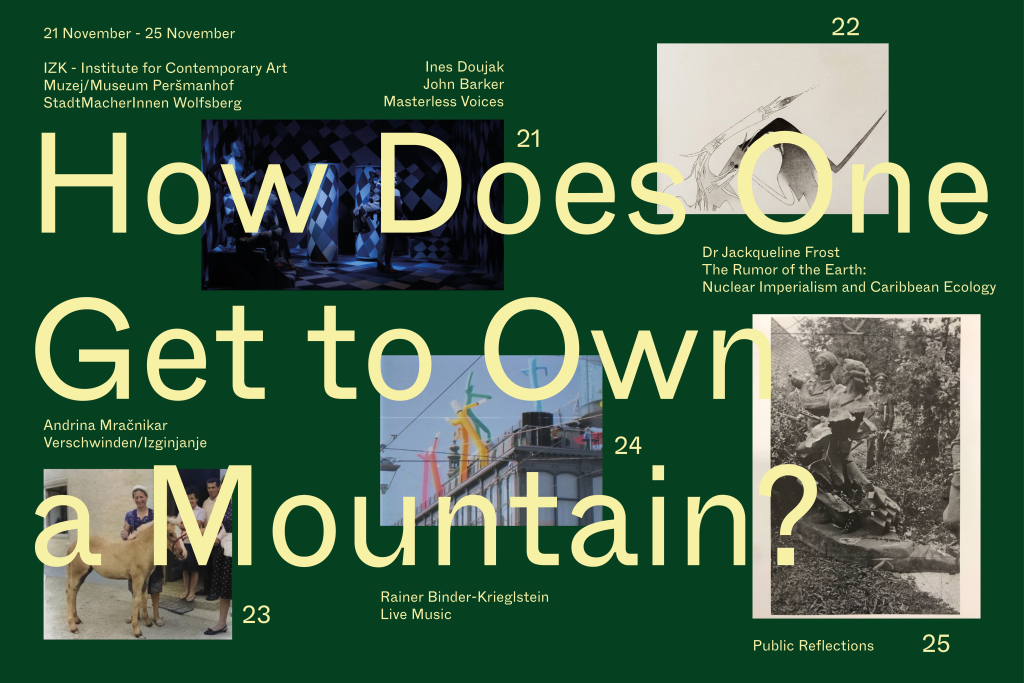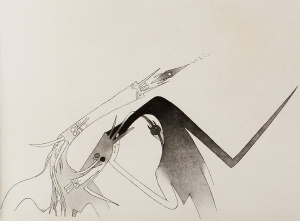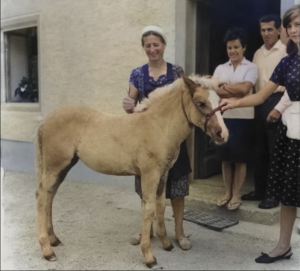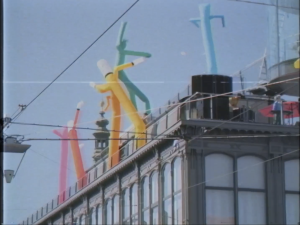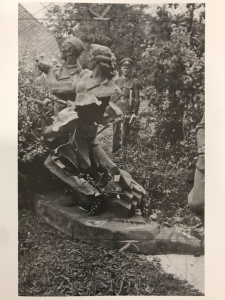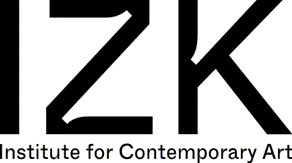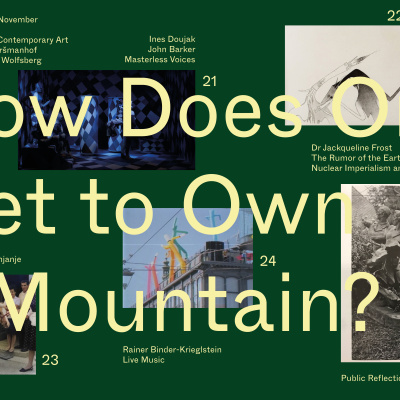This program is developed in the framework of the IZK - Institute for Contemporary Art course, Art-Based Investigation which takes the site of a lithium tunnel on the Koralm mountain range in Wolfsberg, Carinthia, as the object through which to consider processes of extraction, labour, value creation, and accumulation and dispossession. Building on our investigation of the site of the tunnel and mining history in the region, we will explore the fascist, imperial and capitalist history and present. Within the excursion, we will combine the study of surrealist practices and their histories, with our investigation of this site and its ecologies, attempting to collectively find artistic positions and forms that respond to the complexity unfolding in this political context.
Organised by
Rose-Anne Gush, Anousheh Kehar, Philipp Sattler (IZK) in cooperation with StadtMacherInnen
Location
Johann-Offner-Straße 13, Wolfsberg, Austria
Program Overview
Monday, 21.11.2022, 19.00 Screening: Ines Doujak and John Barker, Masterless Voices (2014); Collective introduction (English) Music and drinks
Tuesday, 22.11.2022, 19.00 Lecture: Dr Jackqueline Frost, The Rumor of the Earth: Nuclear Imperialism and Caribbean Ecology (English) Music and drinks
Wednesday, 23.11.2022, 19.00 Screening and discussion: Andrina Mračnikar, Verschwinden/Izginjanje (2022) (German/Slovenian) Music and drinks
Thursday, 24.11.2022, 20.00 Live Music Rainer Binder-Krieglstein
Friday, 25.11.2022, 14.00 Public reflections on the project (German/English)
Program Details
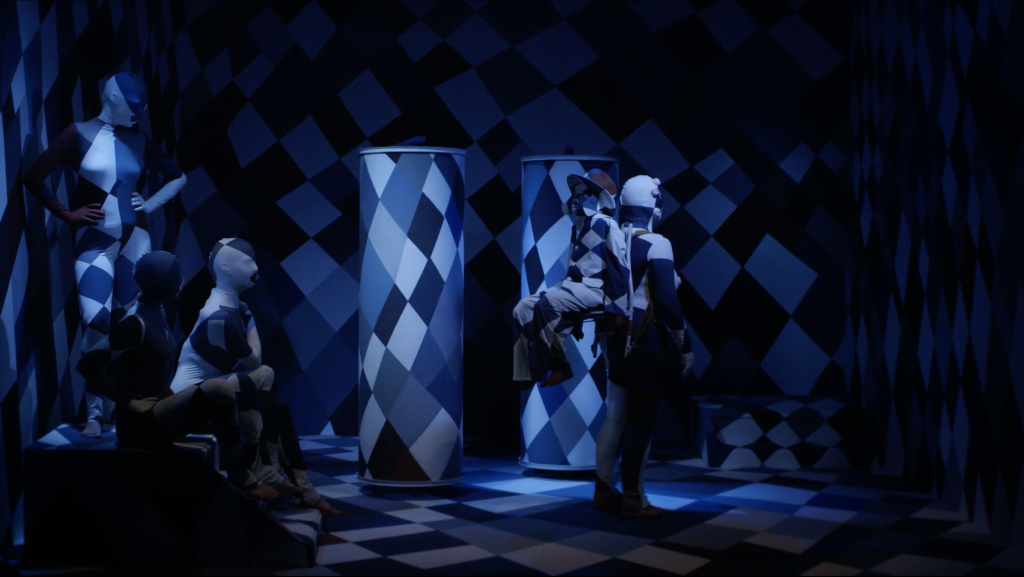
Still from Ines Doujak and John Barker, Masterless Voices (2014)
Monday, 21.11.2022, 19.00 Screening
Ines Doujak and John Barker, Masterless Voices (2014)
Interested in uncovering how histories of globalisation impact contemporary socio-cultural conditions, Masterless Voices retraces the roots of carnival to patterns of extraction, labour, and trade, but also to rebellion and joy.
Ines Doujak (b. 1959, Klagenfurt, Austria) lives and works in Vienna, Austria. Doujak’s multidisciplinary practice spans across photography, performance, film and installation. She is working on deconstructing the political implications of sexist and racist stereotypes. Drawing on the tradition of carnival, masquerade and motifs from cultural history, she uncovers exploitative structures and inequalities in society, often in relation to colonial histories. Her research into the textile industry has resulted in numerous works concerning gender, class and cultural conflicts related to the global production, trade and distribution of fashion and textiles. Exhibitions include Kunstalle Wien (2021); Bergen Assembly, Norway (2019); Kochi-Muziris Biennale, India (2018); Dhaka Art Summit, Bangladesh (2018); Lentos Kunstmuseum, Austria (2018); Para Site, Hong Kong (2018); and documenta 12, Kassel (2007).
John Barker (b. 1948) lives and works in London, UK. Barker is a writer, essayist and performer. Since the 1970s, he has focused on economics, geopolitical dynamics and the exploitation of labour. His novels include Radio Signals and Futures, whilst his essays have been published in Mute, Telepolis, Adbusters, Capital and Class and Variant among others. Exhibitions include Bunkier Sztuki Gallery of Contemporary Art, Kraków (2017); Württembergischer Kunstverein, Stuttgart (2018); São Paulo Biennial (2014); and Busan Biennale, South Korea (2012).
Ines Doujak and John Barker have collaborated since 2010. They work together through a common interest in the political dimension of cultural exchanges.
Tuesday, 22.11.2022, 19.00 Lecture
Dr Jackqueline Frost, The Rumor of the Earth: Nuclear Imperialism and Caribbean Ecology
Cuban artist Wifredo Lam’s artist books, particularly those from the 1960s and 1970s, are only available in the rare book rooms of elite libraries or in his family’s archive in Paris. Due to the scarcity of these documents, Lam’s artist books represent an alternative archive, one that bears witness to little-known collaborations, especially with French poets. Upon examination, these image-text archives reveal more than just modernist poetry and engravings. Lam’s trilogy of artist books made with Ghérasim Luca (Apostroph’ Apocalypse 1967), André Pieyre de Mandiargues (Croiseur noir 1972), and René Char (Contre une maison sèche 1975) interrogate the themes of nuclear arms and terrestrial annihilation. The trilogy does so by juxtaposing two different ends of the world: the end of the colonial world through decolonization and the end of terrestrial life in nuclear war. By reading one of these works, Contre une maison sèche, in continuity with late 1960s anti-nuclear struggles—such as the nuclear imperialism of uranium mining in the Congo—, I will show how Lam’s artworks illuminate the transformation of landscapes through nuclear weapons systems. For Lam and his collaborators, the threat of nuclear destruction transforms the meaning of the Earth, as the Earth’s relation to a “post-atomic” humanity heralds an apocalyptic vision of planetary crisis. Through these connections, I will suggest that we think formal decolonization and anti-nuclear ecology together as a point of historical reference for the current ecological crisis. What I call “the rumor of the Earth,” after Lam’s 1950 painting, names the possible but as-yet undiscovered forms of inhabiting the Earth and of making new relations at all levels of the general ecology.
Dr. Jackqueline Frost is Teaching fellow in International Politics at the University of London Institute in Paris, and a member of Groupe Aimé Césaire (ITEM-CNRS/ENS), where she conducted postdoctoral research. Frost’s research centers on the political and aesthetic theory produced by militant intellectuals between France and the Caribbean from the Second World War until end of formal decolonization (c. 1940-1980). With a focus on the transatlantic circulation of ideas, she explores links between politics, philosophy and cultural production using methods drawn from intellectual and cultural history, as well as cultural studies and political philosophy. She has published on topics such as anti-nuclear and ecological struggles during the Global Cold War, the cultural policy of the Cuban Revolution and the Tricontinental, C.L.R. James and the London-based Caribbean Artists Movement, dramatic representations of the Haitian Revolution, gay liberation politics during decolonization, the poetics of antifascism in late imperial France and on Haitian socialist realism in the Third World communist movement. In collaboration with Jorge Lefevre Tavárez (Universidad de Puerto Rico), she is editing the first anthology of Haitian Marxist theory in English translation for the Historical Materialism book series. Fost’s new project, “Nuclear Imperialism and Afro-Caribbean Ecology,” examines how Caribbean societies in the midst of decolonization were influenced by the world-shaking threat of nuclear disaster. This research links nuclear imperialism, terrestrial apocalypse and decolonial ecology by interrogating the Cold War political aesthetics of Jamaican philosopher Sylvia Wynter, Cuban artist Wifredo Lam and Martiniquan poet-playwright Aimé Césaire.
Wednesday, 23.11.2022, 19.00 Screening and discussion
Andrina Mračnikar, Verschwinden/Izginjanje (2022)
In her documentary film Disappearance/Izginjanje, filmmaker Andrina Mračnikar embarks on a personal search for clues in her southern Carinthian homeland: Why is the Slovene language, and with it Slovene culture, disappearing more and more from everyday life? The personal is highly political here. Based on the stories of her own family, Mračnikar leads us through a hundred years of Austrian history, which, in Carinthia, is marked by political failures and the missed opportunity to value Slovene as an enriching and indispensable part of Austria.
Andrina Mračnikar was born in 1981 in Hallein and grew up in Ljubljana, Klagenfurt/ Celovec and Keutschach/Hodiše. She studied art history in Vienna and film directing at the AGRFT in Ljubljana. From 2002 she studied directing and writing and dramaturgy at the Vienna Film Academy with Michael Haneke and Walter Wippersberg. In 2010 Andrina Mračnikar completed both studies with distinction. After winning several awards for her documentaries, her first feature film MA FOLIE was released in 2015. The film screened at numerous international festivals, winning the prestigious First Steps Award among many others, including an Austrian Film Award and two nominations for the Golden Romy. Her first work for ORF "Universum History - Kärnten/Koroška - Ein Jahrhundert unterm Mittagskogel /Stoletje pod Jepo" (in collaboration with Robert Schabus) was nominated for the Adult Education Television Award. Verschwinden/ Izginjanje is the third part of her trilogy about the history and future of the Slovene ethnic group in Carinthia, after Andri 1924-1944 and "Der Kärntner spricht Deutsch".
Thursday, 24.11.2022, 20.00 Live Music, Rainer Binder-Krieglstein
Friday, 25.11.2022, 14.00 Public reflections on the project (German/English)
Cooperation partners
IZK - Institute for Contemporary Art, Faculty of Architecture, TU Graz; Muzej/Museum Peršmanhof, StadtMacherInnnen Wolfsberg
